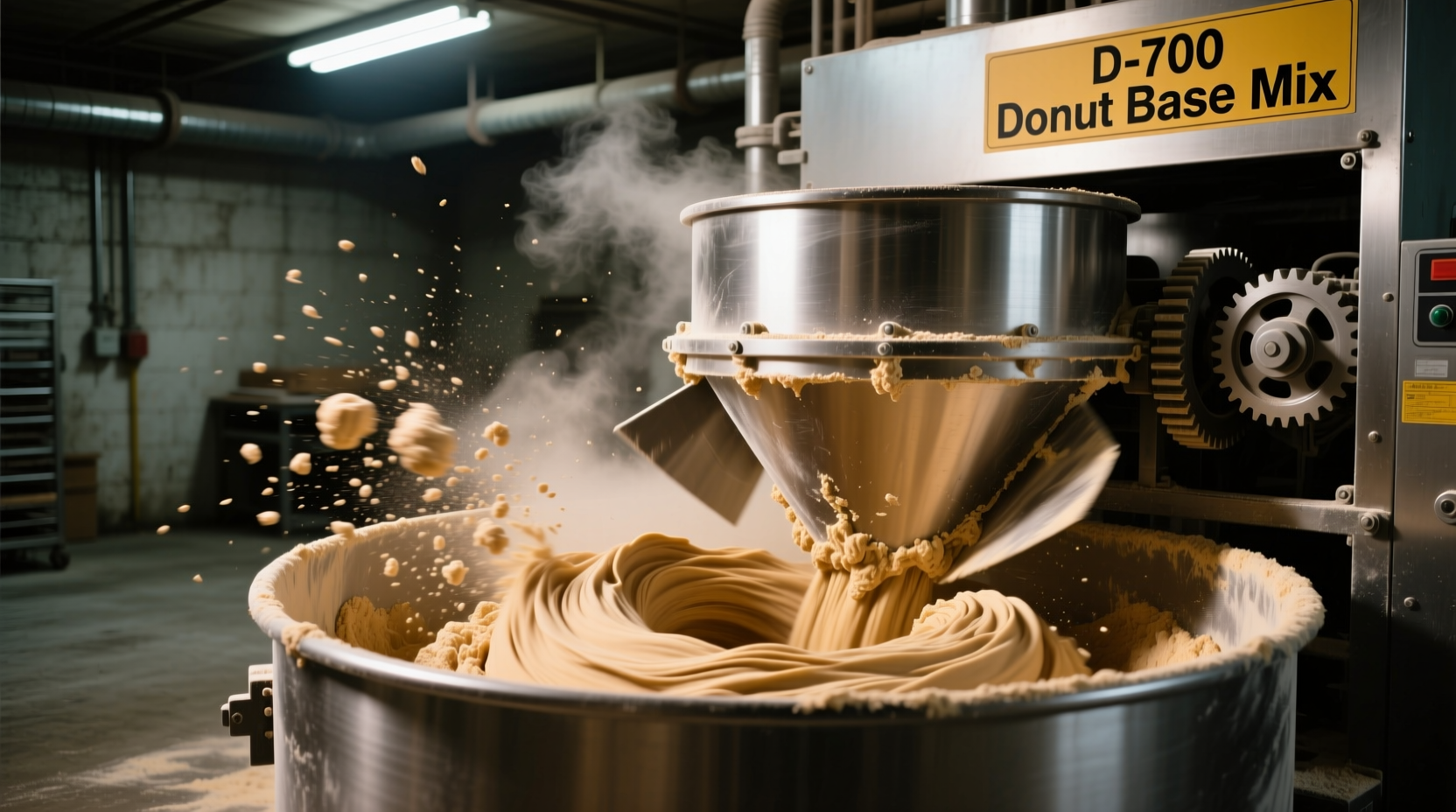Understanding seed material preparation is critical for commercial bakeries aiming to maintain product consistency across large production runs. Unlike home baking where dough is prepared in single batches, industrial donut manufacturing requires a meticulously calibrated seed formulation that serves as the foundation for thousands of units.
Why Seed Material Matters in Donut Production
The seed mixture acts as the biological and chemical catalyst for the entire donut production process. When properly formulated, it ensures:
- Consistent fermentation across production shifts
- Uniform texture and crumb structure in finished donuts
- Optimal rise characteristics during frying
- Extended shelf life through controlled enzymatic activity
- Predictable flavor development throughout production
Industrial bakeries typically maintain seed material at 10-15% of the total dough formula, with variations depending on production speed and donut style. The seed's temperature, hydration level, and fermentation time directly impact the final product's quality metrics.

Technical Specifications for Donut Seed Material
Professional donut manufacturers follow precise parameters when preparing seed material. The table below outlines critical specifications based on industry standards from the American Association of Cereal Chemists:
| Parameter | Standard Range | Critical Threshold | Measurement Method |
|---|---|---|---|
| Yeast Content | 1.5-2.5% of flour weight | >3.0% causes over-fermentation | Weight-based measurement |
| pH Level | 4.8-5.2 | <4.5 or >5.5 affects texture | Digital pH meter |
| Temperature | 78-82°F (25-28°C) | >86°F kills yeast activity | Infrared thermometer |
| Fermentation Time | 3-4 hours | >5 hours creates off-flavors | Timed process control |
Evolution of Seed Preparation Techniques
The methodology for preparing donut seed material has evolved significantly over the past three decades. Understanding this timeline helps modern producers appreciate current best practices:
- 1990s: Manual preparation with inconsistent temperature control; seed batches varied by shift and operator
- Early 2000s: Introduction of temperature-controlled fermentation chambers; standardized timing protocols
- Late 2000s: Automated mixing systems with digital monitoring; implementation of HACCP controls for seed preparation
- 2010s: Integration of IoT sensors for real-time monitoring; predictive analytics for optimal fermentation endpoints
- Present: AI-assisted seed formulation adjustments based on environmental factors and ingredient variables
Production Scale Considerations
Seed material requirements differ significantly based on production volume. These context boundaries help determine appropriate seed preparation protocols:
- Artisanal (under 500 units/day): Small-batch seed preparation with manual monitoring; allows for greater flexibility in fermentation times
- Regional Bakery (500-5,000 units/day): Standardized seed batches with temperature-controlled environments; requires precise timing protocols
- Industrial Production (5,000+ units/day): Continuous seed preparation systems with automated monitoring; necessitates strict parameter controls and redundancy systems
Attempting to scale artisanal seed preparation methods to industrial production typically results in inconsistent product quality and increased waste. The American Institute of Baking recommends completely separate protocols for operations exceeding 2,000 units per day.
Quality Control Protocols for Seed Material
Professional donut manufacturers implement rigorous quality checks at multiple stages of seed preparation:
- Initial ingredient verification: Testing flour protein content, yeast viability, and sugar composition before mixing
- Mid-fermentation checks: Monitoring pH levels and temperature every 30 minutes during active fermentation
- Viscosity testing: Using standardized flow measurements to confirm proper gluten development
- Gas production measurement: Quantifying CO2 output to verify yeast activity levels
- Sensory evaluation: Trained staff assess aroma and texture characteristics at critical control points
When seed material falls outside specifications, manufacturers must either adjust processing parameters for the main dough or discard the batch entirely. The FDA Food Code section 8-303.11 requires documentation of all corrective actions taken when critical limits are exceeded.
Troubleshooting Common Seed Material Issues
Experienced production managers watch for these common seed preparation problems and their solutions:
- Slow fermentation: Caused by low yeast viability or incorrect temperature; solution involves adjusting yeast quantity or warming environment
- Overly acidic seed: Results from extended fermentation; requires pH adjustment or shortened fermentation time
- Inconsistent texture: Often due to improper hydration; corrected through precise water measurement systems
- Off-flavors: Indicates contamination or expired ingredients; necessitates complete sanitation and ingredient replacement
Maintaining detailed production logs helps identify patterns in seed material performance. The International Association of Culinary Professionals recommends keeping at least 90 days of seed preparation records for quality analysis and process improvement.
Best Practices for Modern Donut Production
Leading manufacturers incorporate these evidence-based practices for optimal seed material preparation:
- Implementing automated temperature monitoring systems with real-time alerts
- Using calibrated digital scales for all ingredient measurements (±0.5g accuracy)
- Conducting regular yeast viability testing (minimum weekly)
- Training staff on visual indicators of proper seed development
- Establishing clear documentation protocols for all seed preparation steps
According to research published in the Journal of Food Engineering, bakeries that implement these practices see a 22% reduction in production waste and a 17% improvement in product consistency metrics. The study followed 47 commercial bakeries over 18 months, tracking seed preparation protocols against final product quality indicators.
What is the ideal temperature for donut seed material during fermentation?
The ideal temperature range for donut seed material during fermentation is 78-82°F (25-28°C). Temperatures below this range slow yeast activity, while temperatures above 86°F (30°C) can kill yeast organisms and create off-flavors in the final product.
How long should donut seed material ferment before adding to main dough?
Donut seed material typically requires 3-4 hours of fermentation time at optimal temperature. The exact duration depends on yeast concentration, ambient conditions, and desired flavor profile. Professional manufacturers use pH testing and gas production measurements to determine precise fermentation endpoints rather than relying solely on time.
Can I use the same seed formulation for cake donuts and yeast-raised donuts?
No, cake donuts and yeast-raised donuts require fundamentally different seed formulations. Yeast-raised donuts need active biological seed material with proper yeast content, while cake donuts typically use chemical leaveners in the main batter without a separate seed preparation step. Attempting to use the same formulation would result in poor texture and improper rise characteristics.
What percentage of total dough should seed material comprise?
Seed material typically comprises 10-15% of the total dough formula in commercial donut production. The exact percentage varies based on production scale, donut style, and specific formulation requirements. Larger operations often use the lower end of this range, while artisanal producers may use higher percentages for more pronounced flavor development.
How do I know if my seed material has properly fermented?
Properly fermented seed material should show visible bubbles, have a slightly tangy but pleasant aroma, measure between pH 4.8-5.2, and exhibit a smooth, elastic texture. Professional producers also measure gas production rates and perform small test bakes to verify performance before committing to full production batches.











 浙公网安备
33010002000092号
浙公网安备
33010002000092号 浙B2-20120091-4
浙B2-20120091-4